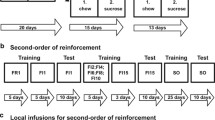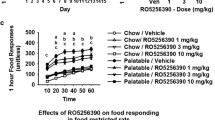Abstract
Rationale and objectives
Previous work indicated that tolerance to the anorectic effect of the cannabinoid CB1 receptor antagonist/inverse agonist, rimonabant, developed rather rapidly in rats and mice given access to a standard rodent chow. The present study was designed to investigate whether the reducing effect of rimonabant on intake of a highly palatable food such as a chocolate-flavoured beverage underwent a development of tolerance as rapid as that manifested on intake of a standard rodent chow.
Materials and methods
To this aim, Wistar rats were concurrently exposed, with unlimited access for 24 h/day, to the chocolate-flavoured beverage, regular food pellets and water. Rimonabant (0, 1.25, 2.5 and 5 mg/kg; i.p.) was administered once a day for 21 consecutive days.
Results
Rimonabant administration resulted in a dose-dependent suppression of the high, daily intake of the chocolate-flavoured beverage; this effect lasted for the entire 21-day treatment period, without any apparent development of tolerance. Conversely, rimonabant-induced reduction in daily intake of regular food pellets was of a smaller magnitude and was limited to the first 3–4 days of treatment.
Conclusions
Together, these results indicate that chronically administered rimonabant was more effective and longer-lasting in reducing the intake of a highly palatable food than that of regular food pellets in rats. These results also suggest that rimonabant may be more active on the hedonic rather than nutritive properties of diets.




Similar content being viewed by others
References
Arnone M, Maruani J, Chaperon F, Thiébot MH, Poncelet M, Soubrié P, Le Fur G (1997) Selective inhibition of sucrose and alcohol intake by SR 141716, an antagonist of central cannabinoid (CB1) receptors. Psychopharmacology 132:104–106
Bensaid M, Gary-Bobo M, Esclangon A, Maffrand JP, Le Fur G, Oury-Donat F, Soubrie P (2003) The cannabinoid CB1 receptor antagonist SR141716 increases Acrp30 mRNA expression in adipose tissue of obese fa/fa rats and in cultured adipocyte cells. Mol Pharmacol 63:908–914
Carai MAM, Colombo G, Gessa GL (2005) Rimonabant: the first therapeutically relevant cannabinoid antagonist. Life Sci 77:2339–2350
Chaperon F, Soubrié P, Puech AJ, Thiébot MH (1998) Involvement of the central cannabinoid (CB1) receptors in the establishment of place conditioning in rats. Psychopharmacology 135:324–332
Colombo G, Agabio R, Diaz G, Lobina C, Reali R, Gessa GL (1998) Appetite suppression and weight loss after the cannabinoid antagonist SR 141716. Life Sci 63:PL113–PL117
Colombo G, Serra S, Vacca G, Carai MAM, Gessa GL (2005) Endocannabinoid system and alcohol addiction: pharmacological studies. Pharmacol Biochem Behav 81:369–380
Després JP, Golay A, Sjostrom L (2005) Effects of rimonabant on metabolic risk factors in overweight patients with dyslipidemia. N Engl J Med 353:2121–2134
Foltin RW, Brady JV, Fischman MW (1986) Behavioral analysis of marijuana effects on food intake in humans. Pharmacol Biochem Behav 25:577–582
Foltin RW, Fischman MW, Byrne MF (1988) Effects of smoked marijuana on food intake and body weight of humans living in a residential laboratory. Appetite 11:1–14
Forget B, Hamon M, Thiebot MH (2005) Cannabinoid CB1 receptors are involved in motivational effects of nicotine in rats. Psychopharmacology 181:722–734
Fride E, Bregman T, Kirkham TC (2005) Endocannabinoids and food intake: newborn suckling and appetite regulation in adulthood. Exp Biol Med 230:225–234
Halikas JA, Goodwin DW, Guze SB (1971) Marihuana effects. A survey of regular users. J Am Med Assoc 217:692–694
Harrold JA, Williams G (2003) The cannabinoid system: a role in both the homeostatic and hedonic control of eating? Br J Nutr 90:729–734
Higgs S, Williams CM, Kirkham TC (2003) Cannabinoid influences on palatability: microstructural analysis of sucrose drinking after Δ9-tetrahydrocannabinol, anandamide, 2-arachidonoyl glycerol and SR141716. Psychopharmacology 165:370–377
Hollister LE (1971) Hunger and appetite after single doses of marihuana, alcohol, and dextroamphetamine. Clin Pharmacol Ther 12:44–49
Iverson LL (2000) The Science of Marjiuana. Oxford University Press, Oxford
Jbilo O, Ravinet-Trillou C, Arnone M, Buisson I, Bribes E, Péleraux A, Pénarier G, Soubrié P, Le Fur G, Galiègue S, Casellas P (2005) The CB1 receptor antagonist rimonabant reverses the diet-induced obesity phenotype through the regulation of lipolysis and energy balance. FASEB J 19:1567–1569
Koch JE (2001) Δ9-THC stimulates food intake in Lewis rats: effects on chow, high-fat and sweet high-fat diets. Pharmacol Biochem Behav 68:539–543
Mas-Nieto M, Pommier B, Tzavara ET, Caneparo A, Da Nascimento S, Le Fur G, Roques BP, Noble F (2001) Reduction of opioid dependence by the CB(1) antagonist SR141716A in mice: evaluation of the interest in pharmacotherapy of opioid addiction. Br J Pharmacol 132:1809–1816
McLaughlin PJ, Winston K, Swezey L, Wisniecki A, Aberman J, Tardif DJ, Betz AJ, Ishiwari K, Makriyannis A, Salamone JD (2003) The cannabinoid CB1 antagonists SR 141716A and AM 251 suppress food intake and food-reinforced behavior in a variety of tasks in rats. Behav Pharmacol 14:583–588
Milano WC, Wild KD, Hui YZ, Hubbell CL, Reid LD (1988) PCP, THC, ethanol, and morphine and consumption of palatable solutions. Pharmacol Biochem Behav 31:893–897
Navarro M, Carrera MR, Fratta W, Valverde O, Cossu G, Fattore L, Chowen JA, Gomez R, del Arco I, Villanua MA, Maldonado R, Koob GF, Rodriguez de Fonseca F (2001) Functional interaction between opioid and cannabinoid receptors in drug self-administration. J Neurosci 21:5344–5350
Poirier B, Bidouard JP, Cadrouvele C, Marniquet X, Staels B, O’Connor SE, Janiak P, Herbert JM (2005) The anti-obesity effect of rimonabant is associated with an improved serum lipid profile. Diabetes Obes Metab 7:65–72
Ravinet Trillou C, Arnone M, Delgorge C, Gonalons N, Keane P, Maffrand JP, Soubrie P (2003) Anti-obesity effect of SR141716, a CB1 receptor antagonist, in diet-induced obese mice. Am J Physiol Regul Integr Comp Physiol 284:R345–R353
Simiand J, Keane M, Keane PE, Soubrie P (1998) SR 141716, a CB1 cannabinoid receptor antagonist, selectively reduces sweet food intake in marmoset. Behav Pharmacol 9:179–181
Singh ME, Verty ANA, McGregor IS, Mallet PE (2004) A cannabinoid receptor antagonist attenuates conditioned place preference but not behavioural sensitization to morphine. Brain Res 1026:244–252
Tart CT (1970) Marijuana intoxication: common experiences. Nature 226:701–704
Van Gaal LF, Rissanen AM, Scheen AJ, Ziegler O, Rossner S, RIO-Europe Study Group (2005) Effects of the cannabinoid-1 receptor blocker rimonabant on weight reduction and cardiovascular risk factors in overweight patients: 1-year experience from the RIO-Europe Study. Lancet 365:1389–1397
Verty AN, McGregor IS, Mallet PE (2004) Consumption of high carbohydrate, high fat, and normal chow is equally suppressed by a cannabinoid receptor antagonist in non-deprived rats. Neurosci Lett 354:217–220
Vickers SP, Webster LJ, Wyatt A, Dourish CT, Kennett GA (2003) Preferential effects of the cannabinoid CB1 receptor antagonist, SR 141716, on food intake and body weight gain of obese (fa/fa) compared to lean Zucker rats. Psychopharmacology 167:103–111
Acknowledgements
The authors are grateful to Mrs. Maria Elena Vincis for animal care and Ms. Anne Farmer for language editing of the manuscript. The present study was partially supported by Sanofi-Aventis, Milan, Italy.
All the experimental procedures employed in the present study were in accordance with the Italian Law on the “Protection of animals used for experimental and other scientific reasons”.
Author information
Authors and Affiliations
Corresponding author
Rights and permissions
About this article
Cite this article
Gessa, G.L., Orrù, A., Lai, P. et al. Lack of tolerance to the suppressing effect of rimonabant on chocolate intake in rats. Psychopharmacology 185, 248–254 (2006). https://doi.org/10.1007/s00213-006-0327-1
Received:
Accepted:
Published:
Issue Date:
DOI: https://doi.org/10.1007/s00213-006-0327-1




